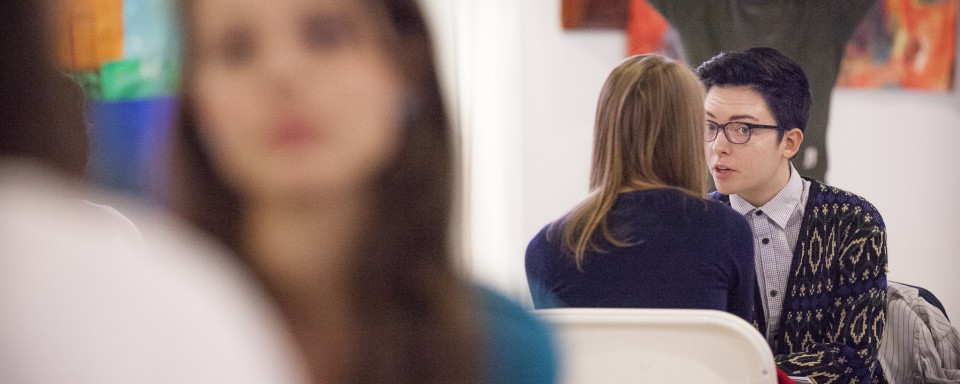by Jacqueline Di Bartolomeo
Students of the Working Class Public History class reflected on their experiences of representing oral histories of Pointe-Saint-Charles which are part of the archive at the Centre for Oral History and Digital Storytelling.
When Prof. High announced, a couple of weeks back, that we would be performing a person from the Pointe and working with the theatre students, my reaction was swift (although not all that positive). “I’m a historian. I don’t move!” I quipped. My protest was only half-joking – more than anything, it was a way to deal with the fact that we would be moving way, way outside my comfort zone in the coming weeks. As I mulled the idea over, I told myself to “keep an open mind,” to be OK with trying new things.
Last Thursday afternoon, I sat down to face a classmate who, for the next hour, would not be my classmate. I gave her a nervous grin. When the bell rang, I introduced myself, not as 24 year-old Concordia student Jackie Di Bartolomeo from Brossard, but as June O’Donnell, 83, from the Pointe.
In the previous days I had watched and re-watched the interview with June as part of the “From Balconville To Condoville?” project in 2013. In the interview, she’s sitting in an armchair in her home, legs uncrossed, sometimes with her elbows on her thighs when she leans forward. More than anything, she projects a sense of frankness, of comfort in (and with) the place that has been her home her whole life. Perhaps that’s why I become rather fond of June, even if I had never met her. I’ve heard of historians feeling similarly close when their research leads them to working with one person for an extend period of time – even if that person is long gone.
I kept in mind Julie Salverson’s warning about the “lie of the literal,” and so I tried to get a sense of what June was like as a person, instead of worrying about getting all the facts right. Still, I approached the assignment very much the university-trained historian, with pen and notepad in hand. I jotted down what I thought were compelling tidbits, stories she told that made me laugh or think. I noted the ways she pronounced street names – “Burgess” for “Bourgeois,” “Fay-vard” for “Favard.” When I sat down for our speed-networking exercise, I came armed with the facts of June’s life.
And that’s exactly how I felt as I said “Hi, I’m June” – even though I was speaking in the first person, I was not embodying her experience in any way that I think would have done her justice. I fumbled, forget her birth date, laughed nervously. I was quite the opposite of the open, warm-hearted woman I was trying to represent.
But then the bell rang and we switched partners, then again. Each time, I said “Hi, I’m June!” with a little more confidence. I also felt most comfortable exchanging in a conversation with the person in front of me. As June, I would ask whether the other person was from the Pointe, too. Do you remember those guys who would sell chips in the park? Those were amazing, I would say. It felt easier, more natural, to have a conversation than to give a 90-second rundown of who I was. I settled on a few stories that I felt comfortable telling as June, ones that gave a sense of what my life was like in the Pointe.
I even began to have fun, especially when I encountered other “Junes”. We would throw stories back and forth between us, agreeing on how delicious those chips were, even if the guys probably never washed their hands when they were making them.
By the end of the speed-networking exercise, though, I had felt a seed of doubt growing in my mind. In boiling down a life lived to a few stories, was I essentializing her experience? Was I a surgeon, lobbing of limbs and presenting them as a whole person?
Over the past week, I reflected on that fear within the framework of my work as a journalist. Were the times when, in writing an article, I did exactly the same thing I was afraid of doing with June? I found that undoubtedly that had been the case. Even if no particular examples sprung to mind, I can recall the pressure of the deadline bearing down upon me as I would hastily interview someone over the phone, noting down a few relevant quotes I could plug into my story.
This is not a feeling I will forget, even if my time as an honorary theatre student will be short-lived. I will be taking away that need to be just as careful with the words and the experiences of the people I am working with, no matter the medium.
As I am writing this, the image of Ted Little pointing to his head, then placing his hand on his heart is stuck in my mind. Perhaps it’s too easy a dichotomy, but I saw that divide between living in your head and with your heart last week, as we were invited to re-create our life story in 10 (moving) images. For the most part, the history students reflected with their head, sometimes through writing. Meanwhile, the theatre student would work through their stories with their bodies. I’m not sure how the theatre students’ perspective will change as we work together, but I’m hoping to add towards a more embodied way of learning to add to my oral history practice.
by Jacqueline Di Bartolomeo
